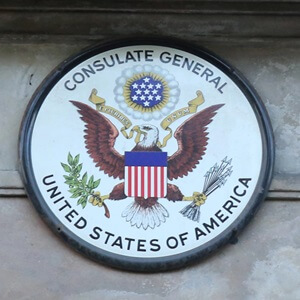Immigrating to the United States is often a life-changing event filled with hope and anticipation. While the process requires attention and strict compliance, a Dallas consular processing lawyer can guide you, especially outside the country. They help avoid common pitfalls, address potential delays, and achieve successful outcomes.
This article explores consular processing, highlighting the steps involved. It also addresses common causes of delays or denials to help individuals avoid or prevent them effectively. Importantly, it tackles the invaluable role of attorneys and the things to consider when hiring one.

Understanding The Consular Processing
The consular process allows individuals outside the United States to apply for lawful permanent resident status. It requires completing specific stages with U.S. Citizenship and Immigration Services (USCIS) and the Department of State. Understanding the steps involved helps avoid delays and ensure a successful outcome.
Determining Eligibility
The first step in consular processing is determining eligibility for a Green Card. Most applicants qualify through family- or employment-based petitions. Others may be eligible through humanitarian programs, such as asylum or refugee status.
Filing The Immigrant Petition
After confirming eligibility, the petitioner must file the appropriate immigrant petition with USCIS. Family-based petitions require Form I-130, Petition for Alien Relative, submitted by a U.S. citizen or lawful permanent resident. Employment-based petitions often involve Form I-140, Immigrant Petition for Alien Worker, filed by the employer.
In some instances, such as investment-based immigration, applicants can file Form I-526, Immigrant Petition by Alien Investor. Approval of this petition is necessary to advance to the next step.
Waiting For Petition Approval & Visa Availability
Once USCIS approves the petition, the case moves to the National Visa Center (NVC). The NVC assigns a priority date and holds the case until a visa number becomes available. Applicants must monitor the Department of State’s Visa Bulletin to determine when their priority date is current.
Submitting Fees & Documentation To The NVC
Once the visa becomes available, the NVC requests visa application fees and required documentation. Applicants must submit Form DS-260 and essential documents such as proof of relationship, financial affidavits, and police clearance certificates. Accurate and complete submissions prevent delays and ensure the case progresses smoothly.
Attending The Consular Interview
After receiving all documents, the U.S. Embassy or Consulate schedules an interview to review the application and supporting evidence. Applicants must provide original documents, including medical exam results and police certificates. The embassy or consulate may approve the visa, request additional evidence, or deny the petition.
Presenting The Visa Packet Upon Arrival
If the visa is approved, the consular officer provides the applicant with a sealed “Visa Packet.” Upon arriving in the United States, applicants present this packet to Customs and Border Protection (CBP) officers. They determine whether the individual can be admitted as a lawful permanent resident.
Receiving The Green Card
After admission to the U.S., USCIS processes the visa and issues the Green Card. Paying the USCIS Immigrant Fee ensures timely issuance of the card. If the card does not arrive within 90 days, applicants must contact USCIS for assistance.
Every step in the consular process demands accuracy and attention to detail. Missteps can lead to significant delays, underscoring the importance of proper preparation and legal support. It is essential to understand the common reasons for delays and how they can be resolved effectively.
Common Causes Of Processing Delays Or Rejections
Processing delays or rejections during consular processing are often preventable but can be frustrating and time-consuming. Understanding the common issues can help applicants address potential challenges and keep their cases on track.

Documentation Errors
Missing, incomplete, or inconsistent documents are among the most frequent causes of delays. Immigration forms often require precise details; even minor mistakes can halt the process. Submitting incorrect or outdated documents to the National Visa Center (NVC) may result in time-consuming rejections.
Administrative Processing Delays
Specific applications undergo administrative processing, which involves additional background or security checks. This step can significantly extend wait times, sometimes weeks or even months. Factors triggering this process may include travel history, the name matching with watchlists, or incomplete data.
Ineligibility Issues
Health concerns, prior immigration violations, or criminal records can complicate the process. Applicants in such situations may require waivers to proceed, which add additional steps to the timeline. Legal advice becomes critical in these cases to effectively demonstrate eligibility and resolve ineligibility concerns.
Miscommunication With Authorities
Miscommunication with the NVC or embassy often leads to avoidable delays. Late responses to document requests or unclear instructions can set applicants back. Consistent follow-up and a clear understanding of requirements keep the process on track and prevent unnecessary frustrations.
Each of these challenges can create stress and uncertainty for applicants. However, proper preparation and legal support can mitigate many of these obstacles. A Dallas consular processing attorney can prevent these pitfalls, increasing the chances of a smooth and successful experience.
The Role Of A Dallas Consular Processing Lawyer
The process involves detailed steps and strict requirements, leaving little room for error. However, an immigration attorney provides invaluable guidance. They ensure applicants avoid common pitfalls, address challenges effectively, and confidently move through the process.
Ensuring Document Accuracy And Submission
A lawyer thoroughly reviews all forms and documents before submission to ensure they are accurate and complete. Errors or missing information often cause delays, but legal oversight significantly reduces these risks. Lawyers also verify that all submissions meet specific requirements, streamlining the preparation and preventing unnecessary setbacks.
Guiding Clients With The Requirements
Each step, from filing fees to submitting supporting documents, comes with specific requirements. A lawyer helps clients meet deadlines, understand expectations, and avoid missteps. This support ensures that cases progress smoothly through the system without unnecessary interruptions.
Preparation For Consular Interview
The consular interview is often the most nerve-wracking part of the process for applicants. A lawyer helps clients prepare by conducting mock interviews and addressing potential questions. This preparation gives applicants the confidence to present their cases clearly and effectively during the interview.
Resolving Administrative Processing Issues
Lawyers advocate for expedited resolutions when applicants face administrative holds or visa denials. They communicate directly with embassies or consulates to address concerns and advance stalled cases. Attorneys also handle waiver applications and ensure additional documentation is submitted promptly and correctly.
Preventing Future Delays
Proactive legal support reduces the risk of delays at any stage of the consular process. Ensuring thorough preparation and compliance with immigration rules helps applicants avoid disruptions and focus on their plans.
Each role highlights the value of having a lawyer guide applicants through the process. A thorough evaluation of potential attorneys ensures applicants hire the proper legal support for their needs. Choosing an experienced lawyer can significantly improve the chances of achieving a successful outcome.
Things To Look For When Hiring A Skilled Attorney
Hiring the right attorney for consular processing can significantly impact the outcome of your case. The attorney you choose should possess the skills and qualities necessary to prevent errors that cause delays. This approach helps you navigate the process efficiently.
Experience
Choose a lawyer with a proven track record in managing consular processing cases. Experience ensures they understand the unique challenges of each step, from NVC requirements to consular interviews. A lawyer with prior success in similar cases is better equipped to anticipate and resolve potential issues.
Clear & Effective Communication
Communication is key when navigating the legal system. Look for a lawyer who explains complex immigration terms in simple, understandable language. Regular updates and responsiveness to questions are critical for building trust and reducing stress.
Personalized Approach
No two immigration cases are alike, so a universal approach seldom proves effective. A good lawyer takes the time to understand each client’s specific circumstances and develops tailored strategies to address their needs. This personalized support can significantly improve the case outcome.
Accessibility & Responsiveness
Timely communication is essential in immigration matters where deadlines are strict. A lawyer who promptly answers inquiries and keeps clients informed ensures no missed opportunities. Accessibility demonstrates a commitment to the client’s success and builds confidence.
Positive Client Reviews & Testimonials
Past client experiences can offer valuable insights into a lawyer’s capabilities and professionalism. Look for positive testimonials highlighting the lawyer’s dedication, thoroughness, and ability to achieve favorable results. This feedback can provide reassurance when making your decision.
By focusing on these qualities, individuals can find a lawyer who provides the guidance and support needed for a positive result. Hiring from a qualified Dallas consular processing law firm ensures access to experienced attorneys dedicated to achieving successful outcomes.

Dallas Immigration Lawyers: Your Trusted Legal Partners
At Dallas Immigration Lawyers, we recognize how errors in consular processing can lead to frustrating delays. Our team is dedicated to providing thorough preparation and personalized support to help you avoid mistakes that disrupt your immigration journey.
For families, we assist with immigrant visa petitions and affidavits of support and ensure accurate documentation. By addressing potential issues early, we help clients avoid delays that could keep loved ones apart longer than necessary.
For professionals, we offer tailored advice on employment-based visa applications and ensure all submissions meet consular requirements. Whether verifying offers or assisting with employer compliance, we focus on precision to prevent setbacks caused by inaccurate documentation.
Our commitment to clear communication and proactive case management ensures clients feel informed and supported. Reviewing every detail and resolving potential challenges in advance helps you avoid delays and move closer to your immigration goals.
Summary
The consular process is critical for securing U.S. immigrant visas. It requires precise compliance with immigration laws and involves determining eligibility, filing petitions, submitting accurate documentation to the National Visa Center, and attending interviews.
Common delays stem from missing documents, administrative holds, or ineligibility issues, which can be avoided with proper preparation. Choosing the right legal support is essential for a smooth journey toward achieving immigration goals. At Dallas Immigration Lawyers, we ensure accuracy, offer interview preparation, and resolve delays.

